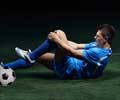sports injuries will be a normal occurrence as the soccer and baseball season is all set to kick off.

Dr. Roux cautions that parents should pay close attention to their child’s pitch count (if they are a baseball or softball player) as well as how many sports they are playing in a given season. Overuse of a child or adolescent’s muscles and joints can not only be painful, but lead to further complications later in life.
“A child or adolescent’s body is not made to see that kind of stress and overuse year round,” adds Dr. Roux. Dr. Roux offers the following advice to help prevent overuse injuries so your little leaguers can be at the top of their game this season.
- Make sure your child receives adequate rest between games or seasons. “Playing basketball and soccer and then going straight into baseball can be stressful on a child’s body, so make sure they are getting enough time to recuperate between seasons or games,” says Dr. Roux. Dr. Roux also says that the amount of rest depends on the sport and the age of the child as well as what position they are playing. “If adequate rest doesn’t take care of the problem then medical attention should be sought.”
- Pay attention to your child’s aches and pains. “Always listen when they complain of pain or discomfort,” says Dr. Roux. “Monitor what parts of their body are in pain and keep a close eye on any swelling.” Parents should also pay attention to any limping, soreness or difficulty moving around that lasts longer than a few days after extreme exertion. “Normal physical activity should not cause any severe or persistent discomfort.”
- Limit weight lifting. “If your young child is lifting weights make sure they are using light weight with higher repetitions,” explains Dr. Roux. “Seemingly trivial exercises like stretches are also a good idea to help minimize any muscle injuries.”









